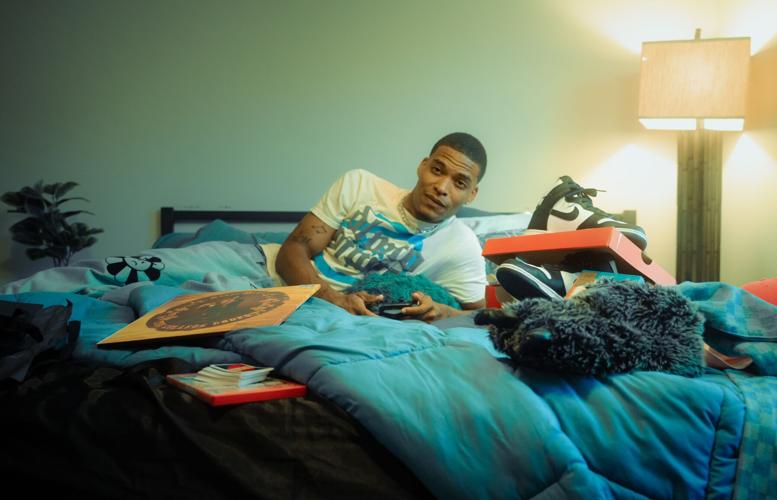
In 2019, fans of Nashville rapper Breion Dixon, better known as 2’Live Bre, might have imagined he was on top of the world. He was on tour, building on national recognition for his appearance on Netflix’s Rhythm + Flow, an American Idol-style competition show for rising hip-hop talent. But he wasn’t feeling fulfilled.
He posted a video on Instagram, which has since been deleted, in which he opened up about his struggle with depression.
He credits one of his professors at Tennessee State University for encouraging him to seek therapy, while inspiring him to use his voice to shed light on an illness that people often don’t feel comfortable talking about. He has made it his mission to speak about his experiences through music, aiming to normalize mental illness and lead his listeners to find healthy ways to cope.
“A lot of people don’t like to claim depression, and instead they like to claim, ‘I’m going through something,’ ” Dixon says. “So many people are dealing with this in a secretive way. I’m like, ‘Let me be the voice and give them music they can relate to.’ It doesn’t matter if it’s a million people or 10 people.”
The road to addressing his mental health hasn’t been easy. Dixon began writing at age 13 while dealing with family issues and looking for an outlet.
“Being raised in two different environments — with my dad and my mom — journaling was the only thing that kept me sane,” he says. “I felt I couldn’t talk about the heavy stuff that was going on at home. Honestly, I was afraid to put my family in a position where people felt we’re not a happy family compared to all the other kids in the neighborhood. One of my friends stole my journal book — he called it a diary. But he read it and then told me, ‘You can rap.’ ”
That spark lit a fire in Dixon. As he chased his dream of becoming an MC throughout high school and college, he worked at building an audience, releasing several independent records, using the name Lil Bre on his earliest releases. Over time, he developed a charismatic presence and an articulate flow, which he used to his advantage in solo tracks and collaborations with standouts from the local hip-hop scene like Gee Slab, Petty and Kiya Lacey. On his 2015 single “Realest in Here,” he even got a feature from celebrated Nashville rapper Young Buck.
While he was still a student at TSU, Dixon launched a talent-search show called Shine with former American Idol competitor Brandon Stewart. The idea was to give independent artists the opportunity to be heard, and give them tools for navigating the twists and turns of the business.
“I know the trials and tribulations,” says Dixon. “We teach [artists] to go after the smallest fish before the big fish, because a lot of these artists lose their identity … because they want to rush success. On the show, we give them insight on what we experience, so they won’t have to face that mental breakdown that a lot of artists do face in their journey of trying to pursue a music career.”
However, Dixon found he still had plenty of room for growth. Just like the up-and-comers showcasing their talent on Shine, he received constructive criticism of his own from judges Cardi B, Chance the Rapper and T.I. on Rhythm + Flow. Although he didn’t win the competition, he connected with Canadian actor and director Jesse Collins to learn more about the business.
Dixon describes how Collins introduced him to a different side of the industry from the part that thrives on hustle, which inspired him to create Butterfly Nation. The nonprofit aims to give youth in the community opportunities to learn about expressing themselves through music via a mentorship program.
“It’s bigger than a nonprofit — it’s a movement for a lot of artists to come together and make awareness towards mental health,” Dixon says. “That’s the biggest purpose. We work with Rocketown, the juvenile [justice] system and children who want to do music.”

Dixon had plans to end his music career this year, but witnessing the effect his songs were having showed him how his personal experiences assist others in healing and searching for professional guidance. On Butterfly Nation’s recent visit to Cora Howe Exceptional School, a Metro school for children with significant learning differences, Dixon performed in part to uplift and entertain the students. But he also made it a point to show them he can relate to their journey. He knows firsthand how important it is for the younger generation to see someone who resembles them bringing something positive to the community. Looking back on his past and the mentorship roles he’s taken on through Butterfly Nation, Dixon finds lessons he plans to use as he raises his son, who was born in September.
“A lot of [the students] just needed a friend — a good friend to go on the right road with. I’m trying to raise my son to be that friend these guys may have met, and would push them on the right track. That’s something that I always think about. I want my son to be a great friend. A great leader that can pour into people just by his presence.”






